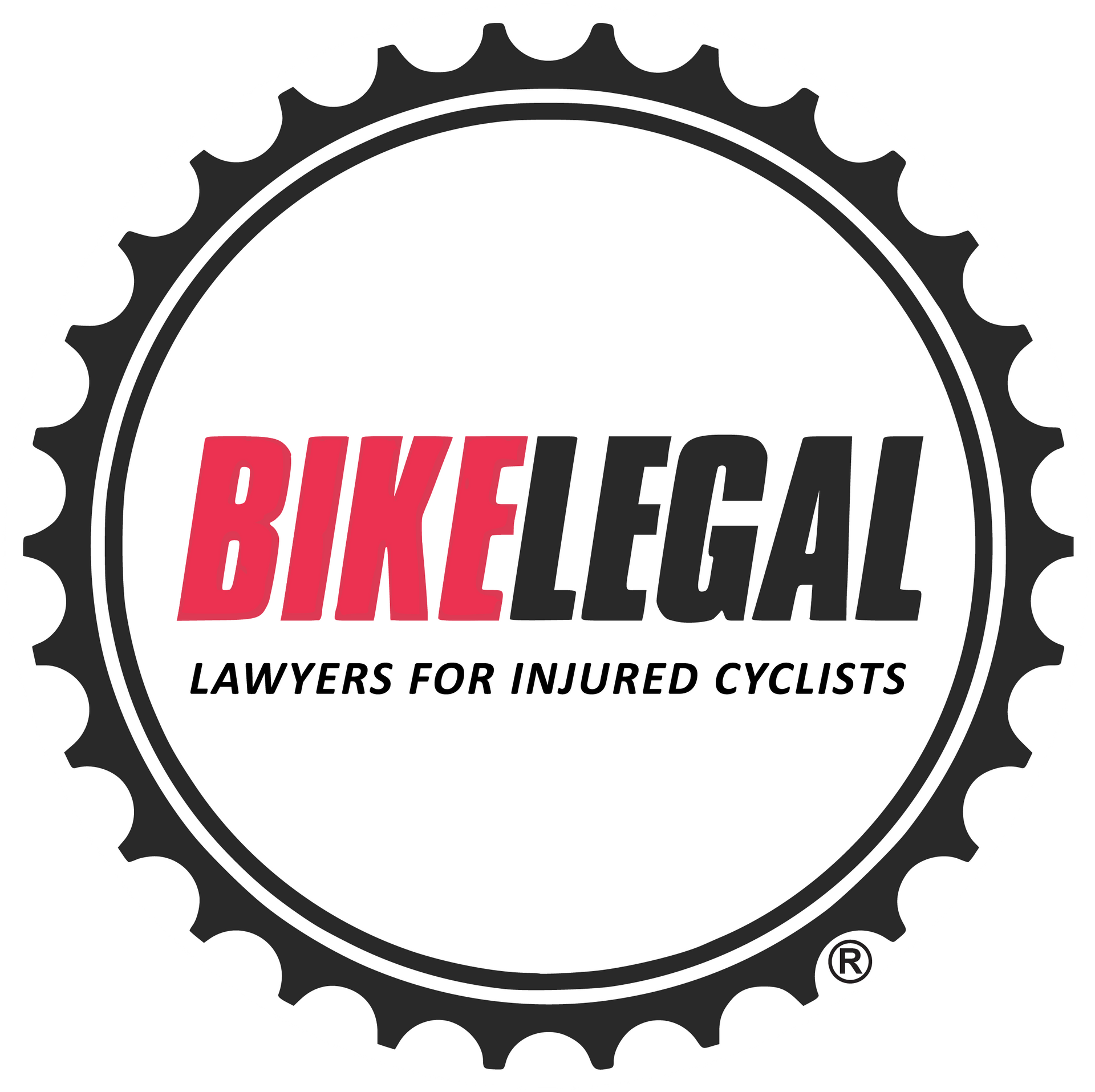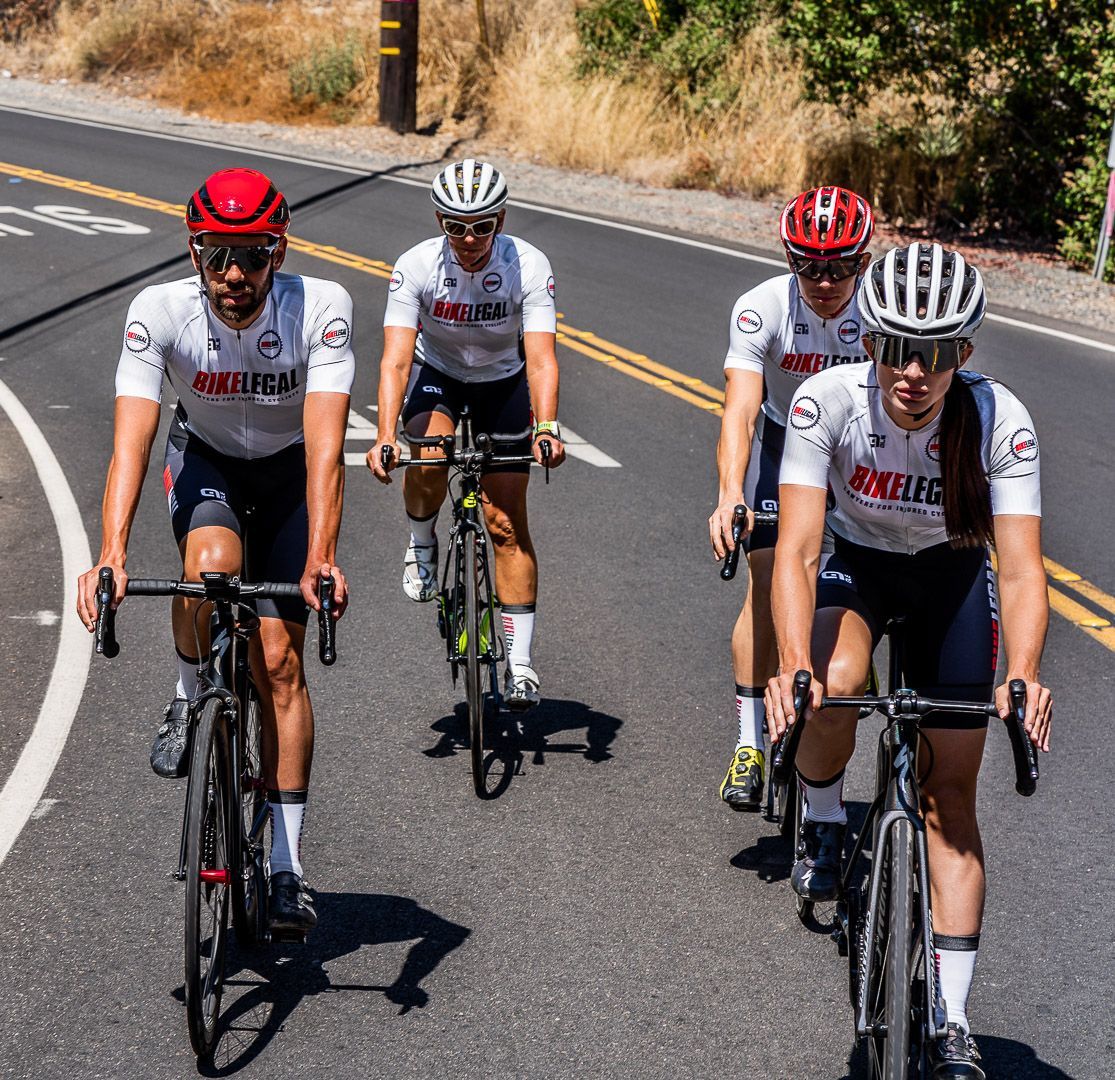Answers to the 21 Most Asked Bicycle Accident FAQs
Follow us on
social media!
Top 21 Bicycle Accident Questions Explained

Dealing with the aftermath of a bicycle accident can be complex and overwhelming. At Bike Legal, we've compiled our comprehensive guide, "Answers to the 21 Most Asked Bicycle Accident FAQs," based on actual questions posed by our clients. This resource addresses the most common questions, from immediate actions post-accident to detailed legal inquiries about compensation and fault. By providing these insights before you might need them, we aim to empower you with knowledge to protect yourself and manage the legal process more effectively, should you ever be involved in a bike accident.
The most frequently asked bicycle accident questions from Bike legal Clients:
- Steps to Take Immediately After a Bicycle Accident
- Why Choosing a Bicycle Accident Lawyer Now is Better than Later
- Understanding Attorney Fees and Payment Structure
- Establishing a Valid Bicycle Accident Case
- Handling Situations with Insufficient Insurance Coverage
- Types of Compensation in Bicycle Accident Cases
- Effects of Partial Fault on Claims
- Claiming Compensation for Bicycle Damage
- Compensation for Lost Wages Due to the Accident
- Timeline for Resolving a Bicycle Accident Case
- Responsibility for Accidents Caused by Defective Roads
- Statute of Limitations for Filing Bicycle Accident Claims
- Importance of Witnesses in Establishing Fault
- Navigating the "Dead Red" Law for Cyclists
- Determining Liability in Bicycle Accidents
- Legal Recourse When Commercial Drivers Cause Accidents
- Pursuing Claims in "No Contact" Accident Scenarios
- Distinguishing Between Civil and Criminal Cases in Bicycle Accidents
- How Fault is Determined in Bicycle Accidents
- Filing Claims Without Wearing a Helmet
- Impact of Pre-existing Conditions on Claims
1. What do I do after a bicycle accident?
After a bicycle accident, your actions can significantly impact your safety and legal rights. Here's a step by step guide to ensure you're safe and prepared for any legal or insurance-related processes that may follow.
Prioritize Safety: Move to a safe area out of harm’s way if you can.
Stay Calm and check for Injuries: Check yourself for injuries. Pay special attention to your head and helmet as head trauma can be serious even without direct impact. Did you know that helmets reduce the risk of head injury by up to 85%? Yet, even with a helmet, head trauma can be serious. Look for signs like dizziness or confusion.
Call 911 if you are injured: If you're injured, it's crucial to get professional medical help. Can't make the call yourself? Ask someone nearby. Whether it's a bystander or the other party involved, getting help is your priority.
Remain at the scene and file a police report: It's vital to remain at the accident scene, fulfilling legal obligations and providing the information needed for a police report. Remember, this report can be a vital piece of evidence.
Exchange information: Swap contact and insurance details with the other party. Don't forget to get information from witnesses too. Their accounts can be invaluable if there are disputes about what happened. Include names, contact details, driver’s license, and insurance information.
Document the scene: Snap photos of the scene, the vehicles involved, any visible injuries, and road conditions. These images can be compelling evidence when filing insurance claims or if the incident leads to legal action.
Avoid extended conversations or negotiations with the other party or insurance companies: NEVER ADMIT FAULT OR PARTIAL FAULT. Contact a specialized bicycle accident attorney for legal advice. In the heat of the moment, it's easy to say things that can be used against you later. Even a simple apology can be misconstrued as an admission of guilt. Keep interactions brief and factual.
Preserve evidence: Preserve all evidence in its post-accident state, including damaged clothing and your bicycle. Do not throw away or repair damaged items, as they may be required as proof in a claim.
Seek medical attention for your injuries no matter how minor the crash: Regardless of the crash's severity, seek medical attention as soon as possible, as some injuries may not be immediately apparent. Follow all medical advice and keep detailed records of treatments and expenses incurred due to the accident. This documentation will be crucial for insurance claims and potential legal proceedings.
Related Article:
The 15 Important Steps to Take After a Bicycle Accident/Crash

2. When should I select a bicycle accident lawyer?
In the U.S., a cyclist is killed approximately every 8 hours on US roads. It's not just about being cautious; it's about being prepared.
Proactive legal preparation: Before you ever need to dial their number, have a bicycle accident attorney in your contacts. Why? Imagine this: You're in an accident. You're dealing with injuries, maybe even hospitalization. Is that really the time you want to start vetting legal representation?
The right time to select an attorney: Don't wait for the crash. Research and choose a bicycle accident lawyer when you're calm, clear-headed, and not under the duress of post-accident stress. If you're frequently riding on public roads, the risk isn't negligible. Being prepared means you're one step ahead if the worst happens.
The benefits of early selection: By choosing your attorney in advance, you ensure that:
You have immediate access to expert legal advice when you need it most.
You can focus on your recovery, knowing your legal rights are in capable hands.
Your loved ones won't have to scramble to find your representation while you're incapacitated.
How do you choose your attorney? Look for someone with a track record in bicycle accident cases. They should understand not just the law, but cycling culture and the specifics of cycling accidents. Ask about their experience, their approach to cases like yours, and their understanding of the cyclist's perspective.
Related article: Why You Should Quickly Hire a Bicycle Accident Lawyer
Remember: Selecting a bicycle accident attorney isn't about anticipating the worst; it's about ensuring that, should the worst occur, you're ready to protect your rights and interests with the best possible advocate at your side.
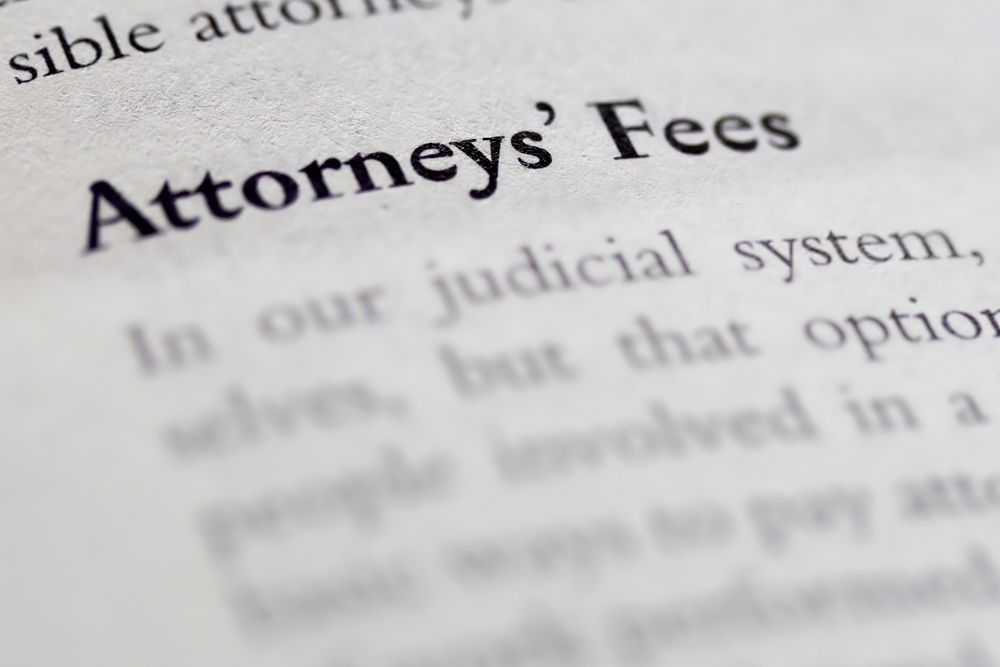
3. Do I have to pay anything to hire a bicycle accident attorney?
Bicycle accident attorneys typically operate on a contingency fee basis, meaning their payment is contingent upon winning the case or securing a settlement. This means you won't pay the attorney a dime unless they win your case or secure a settlement for you.
How does the contingency fee work? Attorneys typically claim a percentage of the compensation you're awarded, generally between 33% and 45%. This approach aligns your attorney's interests with yours – they're motivated to maximize your settlement.
Why does this matter to you? This fee structure is a game-changer, especially if you're worried about upfront costs. It ensures that everyone, regardless of their financial situation, has access to skilled legal representation. Imagine securing top-notch legal expertise without the stress of upfront fees – that's the power of contingency-based legal support.
Read next: How Do Fees for Bicycle Accident Lawyers Work?
Pro tip: While this sounds straightforward, the specifics can vary. Some attorneys might cover all case-related expenses upfront, from filing fees to expert witness fees, which are then reimbursed from the settlement. Others might expect you to handle these costs.
Before you sign on the dotted line, dive deep into the agreement.
Understand the percentage your attorney will take and clarify who covers the initial expenses.
Don't shy away from asking questions – it's crucial to know exactly what you're agreeing to.
Did you know? A study revealed that individuals who hire attorneys for personal injury cases, including bike accidents, typically receive settlements three times larger than those who go it alone. That's a statistic worth considering when you're debating the value of hiring a professional.
4. How do I know if I have a bicycle accident case?
Negligence:
When determining if you have a bicycle accident case, several key factors must be considered. First, it is essential to establish the presence of negligence. Negligence occurs when someone fails to exercise the care that a reasonably prudent person would in similar circumstances. In the context of a bike accident, this could mean a driver not paying attention, disobeying traffic laws, or driving under the influence, among other scenarios. If another party's negligence directly led to your accident and resulting injuries, you might have a valid claim.
Gathering Evidence:
Your best ally is evidence. Whether it's footage from a camera on your bike, a vehicle dash-cam, eyewitness accounts, or traffic camera recordings, these elements can transform your claim from a "he said, she said" situation to undeniable proof.
Measuring Damages:
To elevate your incident to a solid case, you must show tangible harm:
- Physical Injuries
- Psychological Impact
- Medical Expenses
- Loss of Income
- Damage to Your Bike or other property
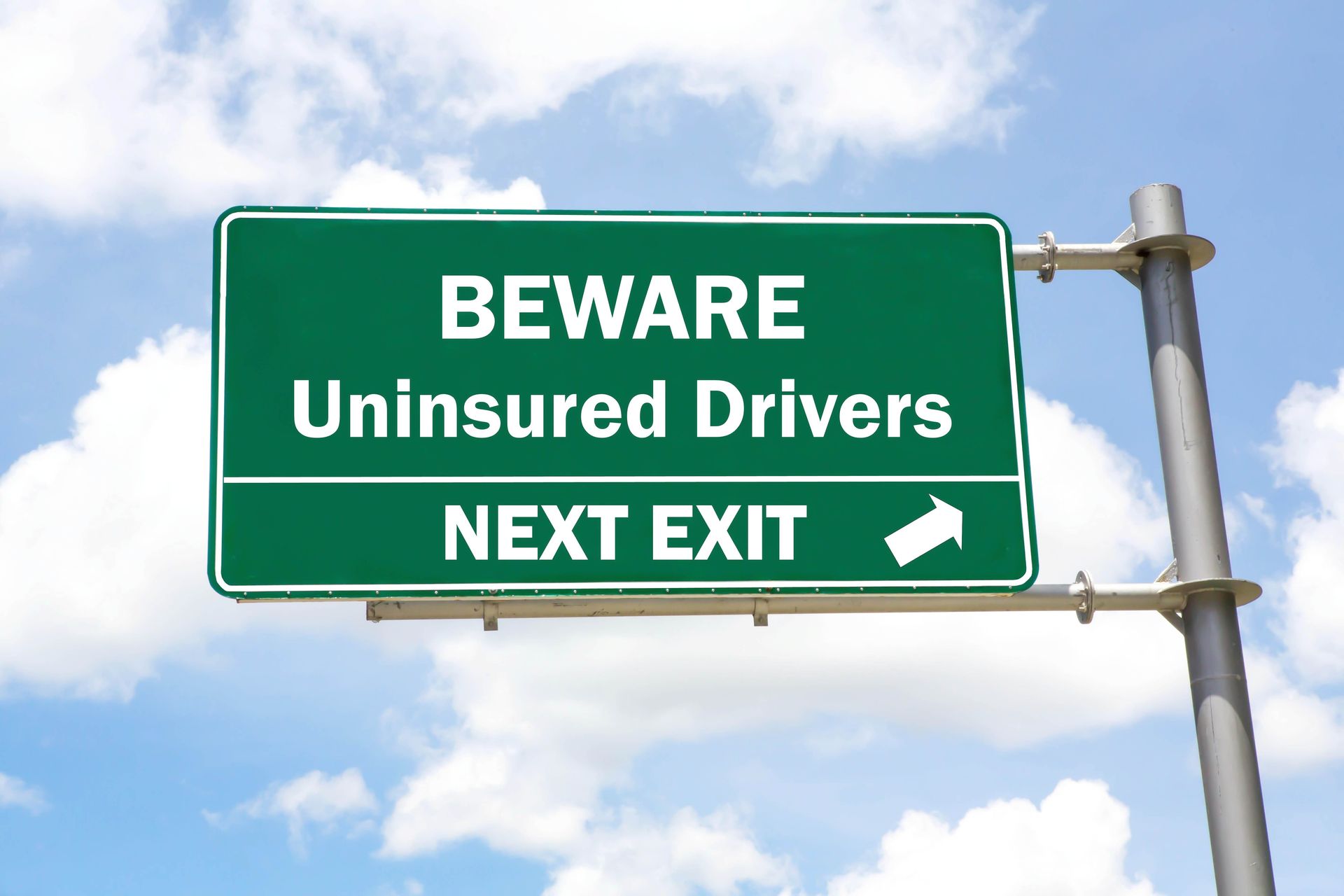
5. What happens if the driver who hit me doesn't have enough insurance to compensate me for my injuries and damages?
If the driver who hit you does not have enough insurance to cover your costs after a bicycle accident, there may be the following options to pursue:
Uninsured/Underinsured motorist coverage: First, check your own auto insurance policy for uninsured or underinsured motorist (UM/UIM) coverage. This is your lifeline when the other party falls short.
Believe it or not, one in eight drivers in the U.S. are uninsured, and many more are underinsured, making UM/UIM coverage more of a necessity than an option.
If you're covered, you can potentially file a bicycle accident claim with your insurer to bridge the gap.
Tapping into the at-fault driver's personal assets: Going after the personal assets of the at-fault driver is another avenue, albeit a rocky one.
Many drivers with insufficient insurance also have limited assets, making this option a daunting and often fruitless endeavor. Yet, in some cases, it might be your only recourse to recoup your losses.
Health insurance: Your health insurance should cover your medical expenses upfront, which sounds like a sigh of relief. However, it's a mixed blessing.
Most health insurance plans have a subrogation clause. This means they might cover your costs now but will expect reimbursement if you receive any settlement or judgment later.
It's like having a financial guardian angel who lends you an umbrella but takes it back the moment it stops raining.
Med Pay and PIP: Lastly, if you have
Med Pay (Medical Payments Coverage) or
Personal Injury Protection (PIP) as part of your auto policy, these benefits can be game-changers. They're designed to pay for medical costs, regardless of who's at fault, providing immediate financial relief without the hassle. Think of Med Pay and PIP as the first responders to your financial injuries post-accident.
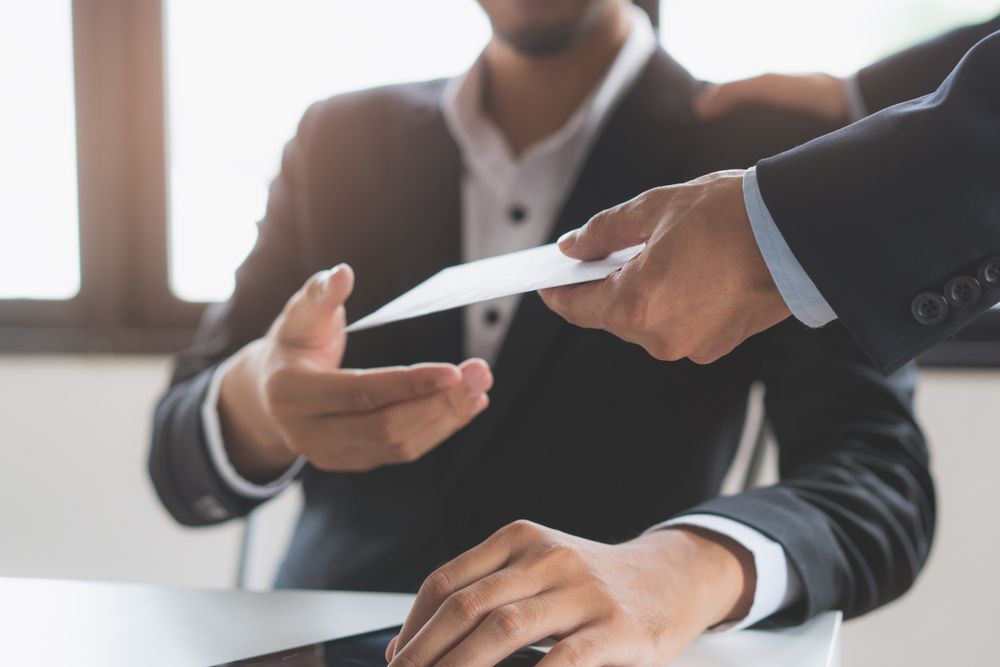
6. What can I be compensated for in my bicycle accident case?
In a bicycle accident case, you may be compensated for a variety of losses, including:
Medical expenses: Your health should be your top priority, and compensation for medical expenses covers the gamut. We're talking about emergency services, hospital stays, surgeries, medications, physical therapy, and any long-term healthcare needs.
In the U.S., medical bills can skyrocket quickly. Did you know that the average cost of a hospital stay after a bike accident can run into tens of thousands of dollars? It underscores why comprehensive compensation is critical.
Lost wages: If your injuries keep you from clocking in, you can recover lost wages. This includes the paycheck hits you've taken during recovery and potential future earnings lost if you're unable to return to your previous capacity.
Loss of future earning capacity is one of the most significant components of many accident settlements.
Property damage: Sure, your bike might be your pride and joy, but compensation doesn't stop there. Any personal items damaged during the incident — think smartphones, smartwatches, and even your cycling gear — should be covered. It's not just about repairing or replacing; it's about restoring your pre-accident state.
Pain and suffering: This is where compensation becomes more subjective. It's about the physical pain and discomfort you endure, yes, but also about how your injuries detract from your quality of life. The law recognizes that the impact of injuries goes beyond the visible and tangible, addressing the deeper impact through your daily existence.
Emotional distress: Accidents leave scars, some you can't see. Compensation for emotional distress covers the psychological aftermath — anxiety, depression, PTSD. It acknowledges that the road to recovery isn't just physical.
Loss of enjoyment: If your injuries keep you from hobbies, sports, or leisure activities that once brought joy, compensation for loss of enjoyment aims to acknowledge that loss. It's a recognition that the value of our passions is immeasurable.
Loss of consortium: The impact of your injuries on your relationships, especially with a spouse or partner, is profound. Loss of consortium compensates for the strain on these relationships, recognizing the broader impact of your accident.
Related articles: Maximizing Compensation with a Bicycle Accident Lawyer
The specific types of compensation you may be eligible to receive will depend on the details of your case, the severity of your injuries, the laws in your state, and the available insurance coverage. It is advisable to consult with a reputable bicycle accident attorney who will pursue all the compensation you're entitled to.
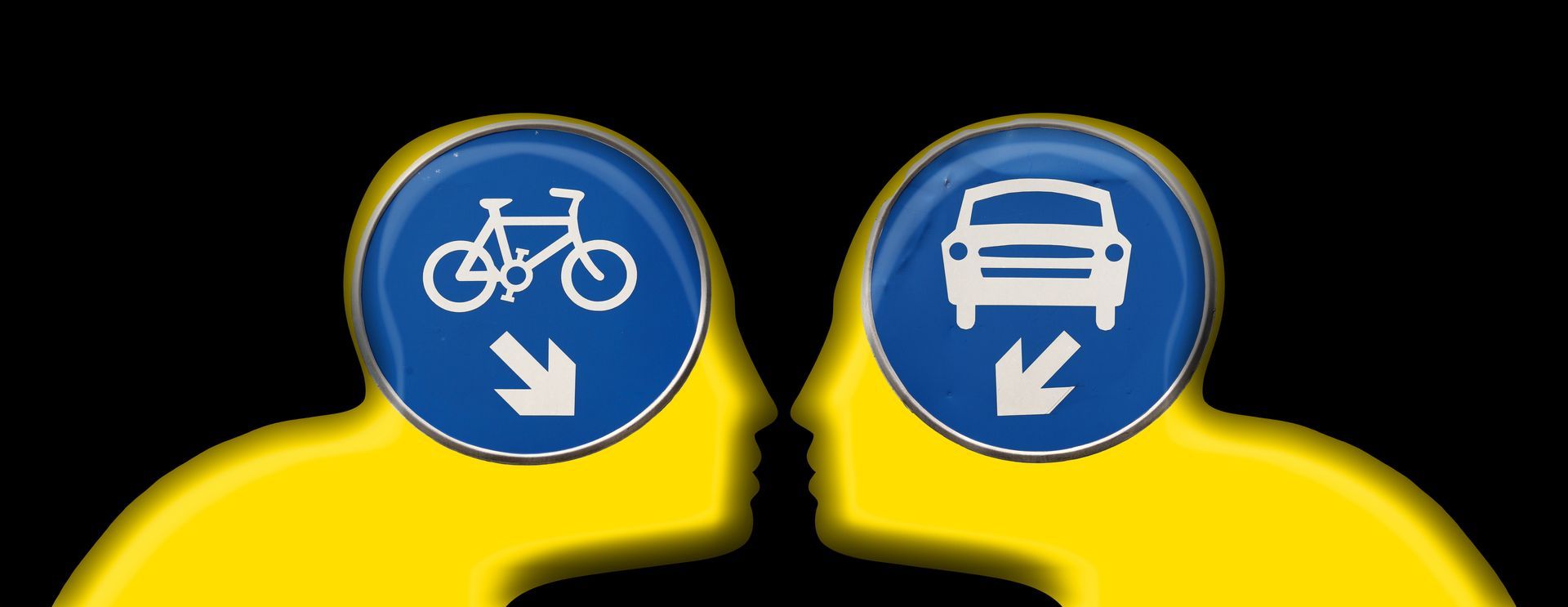
7. What happens with my bicycle accident case if I am found to be at fault?
If you are found to share fault in a bicycle accident, the impact on your case can vary depending on the state's laws regarding comparative negligence or contributory negligence.
Comparative negligence laws: In many states, the concept of comparative negligence comes into play. Here's the deal: if you're found partially at fault, you're not out of the game. You can still claim damages. But here's the catch - the amount you can recover gets trimmed by your fault percentage.
For instance, picture a scenario where you're 30% at fault in an accident with damages totaling $100,000. Under comparative negligence, you're eligible to recover 70% of that amount, translating to $70,000. It's a sliding scale where your share of the blame directly affects your compensation.
Modified comparative negligence: Diving deeper, some states have a twist on the rule, known as modified comparative negligence. It's like a game where you need to keep your fault below a certain level to play. This level is typically set at 50% or 51%. If you're deemed more at fault than this threshold, your chance to recover damages vanishes.
Contributory negligence: Meanwhile, a handful of states still adhere to a strict rule called contributory negligence. It's tough – if you're found even 1% at fault, you're blocked from recovering any compensation. This rule underscores the importance of knowing your state's laws inside and out.
By the numbers: According to the National Highway Traffic Safety Administration, bicyclists account for 2% of all traffic-related deaths and injuries. Yet, the intricacies of fault in accidents involving bicycles vary significantly by state laws, affecting compensation outcomes.
Related articles: The Advantages of Hiring a Bicycle Accident Lawyer in Cases of Shared Fault
It is essential to consult with a bicycle accident attorney such as
Bike Legal to understand how these laws might apply to your specific case. Legal representation can also help to minimize the fault attributed to you and maximize your potential compensation.

8. Will my damaged bicycle be replaced with a new one?
You can claim compensation for property damage of all items that were damaged because of the bicycle accident. The amount you could be compensated for depends on the following:
Insurance coverage: If the person who's at fault has insurance covering property damage, you're in luck. Their policy might just cover the costs to repair or even replace your bicycle, depending on their coverage limits.
Assessing the damage, is it a total loss? The extent of the damage to your bicycle plays a crucial role. If it's damaged beyond the point of repair, the insurance company might label it a total loss. In this case, they may compensate you for a replacement if it is determined your bike is a total loss.
The depreciation dilemma: Here's a twist: compensation takes your bike's current market value into account. This means considering its value right before the crash, not what you paid initially. Depreciation can be a tough pill to swallow but understanding this can help set realistic expectations.
Liability: Everything hinges on proving the other party's liability. Without establishing that the other person is at fault, the pathway to compensation for your damaged bicycle narrows significantly.
The role of legal representation: Don't underestimate the power of a seasoned bicycle accident attorney. Their expertise in dealing with insurance companies can be the game-changer in seeking the maximum compensation possible. They know the ins and outs of the process, making them invaluable in your quest for justice.

9. If I have to miss work because of my cycling accident, will I be compensated for that?
Missing work due to a cycling accident isn't just physically taxing—it hits your wallet hard. But here's some comforting news: compensation for lost wages could be on the table. This means you could recoup the income missed out on because of your bicycle accident injuries. Let's dig into how you can make this happen and ensure you don't lose out financially.
Proving lost wages: First things first, proving your lost income is crucial. You'll need a solid paper trail. Think of pay stubs, a detailed letter from your employer, or recent tax returns. These documents are your best friends in substantiating your claim. Additionally, a letter from your doctor specifying your inability to work is critical. This documentation combo is your ticket to a compelling case for compensation.
Long-term impact: Here's where it gets tricky but also where you can truly assert the value of your claim. If your injuries threaten to bar you from work indefinitely, compensation for loss of earning potential comes into play. This isn't just about the now; it's about securing your financial future.
The specifics matter: Understanding the ins and outs of your insurance policy and local laws is non-negotiable. Jurisdictions and policies vary, and these differences could significantly impact your ability to claim lost wages and future earnings.
The stats speak volumes: The Centers for Disease Control and Prevention reports that, on average, the
annual cost of bicycle-related injuries and deaths totals over $23 billion in the United States. This staggering figure includes medical costs and productivity losses, underscoring the critical importance of securing compensation for lost wages.

10. How long does it take for a bicycle accident case to resolve?
The duration of a bicycle accident case can vary widely depending on several factors, including the complexity of the case, the extent of your injuries and treatment, the legal process in your jurisdiction, and the willingness of the parties to settle.
Factors that shift gears on your case’s timeline
The complexity of the case: A case with complex legal issues or disputed facts can extend the total time need to resolve your claim.
The extent of your injuries: The severity of your injuries and the length of your treatment can put a pause on proceedings, as the full impact on your life needs to be evaluated.
The legal landscape: Every jurisdiction has its own set of rules. The legal processes and backlog in your area can either accelerate or delay your case.
Settlement vs. trial: Settlement discussions can be a shortcut to resolving your case. However, if a consensus cannot be reached, gearing up for a trial can extend the timeline significantly.
The pit stops along the way: Cases might sprint to a resolution in just a few months if the route is clear and both parties are eager to settle. However, should your case take the route to trial, it could be a year or more before you reach a resolution.
The role of a bicycle accident lawyer: Consulting with a bicycle accident lawyer can offer you a tailored estimate of how long your case might take. While they can provide a general timeline, remember, that every case is unique. Unforeseen factors like negotiation breakdowns or additional evidence can affect how long it takes for your case to resolve.
By the numbers
Did you know that the vast majority of personal injury claims, including bicycle and pedestrian accidents, settle out of court? In fact,
95% of these cases never make it to trial. This statistic highlights the importance of understanding the settlement process and how it can impact the timeline of your case.
11. Who is responsible if a defective road caused my bicycle accident?
When a defective road causes a bicycle accident, determining who is responsible can be complex. Local governments typically have the duty to maintain public roadways and ensure they are safe for all users, including cyclists. However, there are instances where private contractors or utility companies may manage the road and could be liable if their negligence has led to unsafe conditions.
Identifying responsibility
Local government entities: Often, the responsibility for maintaining roads falls on local government bodies. Whether it's a city, county, or state agency, these entities are charged with keeping the roads safe for everyone, cyclists included.
Special circumstances: In some cases, private contractors, utility companies, or other third parties might be managing the road. If their negligence contributed to the road's poor condition, they could also be held accountable.
The road to proving negligence
To successfully navigate a claim, proving negligence is key. It involves demonstrating that:
The responsible entity was aware (or should have been aware) of the defective condition.
They failed to repair the defect within a reasonable timeframe or didn't provide adequate warnings.
This negligence directly resulted in your accident and injuries.
It's alarming to note that poor road conditions are a significant factor in more than one-third of all bicycle accidents. This statistic underscores the importance of regular road maintenance and the need for cyclists to remain vigilant.
12. How long do I have to file a claim after a bicycle accident?
The timeframe to file a claim, known as the statute of limitations, varies by state. Typically, you have two years but it can vary between one to six years from the date of the accident to initiate legal action. However, it's crucial to verify the specific timeframe applicable in your state to avoid missing your window for filing a claim.
Why timing matters: Filing within the statute of limitations is critical. If you miss this deadline, you could forfeit your right to seek compensation, no matter how strong your case is. Early filing also ensures that evidence remains fresh and witnesses' memories are clear, which can significantly bolster your case.
Can exceptions extend the filing deadline? In some cases, exceptions may apply, such as if the injured party is a minor or if the defendant leaves the state. It's essential to consult with a lawyer to understand if any exceptions apply to your case.
What should I do if I'm nearing the end of the statute of limitations? If the deadline is approaching, it's imperative to consult with a bicycle accident lawyer immediately to ensure your claim is filed on time.
13. Do I need witnesses to prove the bike collision was not my fault?
Involved in a cycling accident and it wasn't your fault? You might be wondering if witnesses are necessary to prove your side of the story. Let's talk about why having witnesses can be more than just helpful — they can be crucial to steer your case in the right direction.
Why do witnesses matter?
Witness statements: These are the breadcrumbs that lead back to the truth. A third party with no stake in the outcome can provide an unbiased account of the events, which can be persuasive evidence in your favor.
Credibility boost: Witnesses can add a layer of credibility to your claim, especially if their accounts align with yours. They serve as live, breathing evidence that backs up your side of the story.
Details, details, details: In the chaos that follows a collision, you might not notice everything. Witnesses can fill in the gaps, providing details that you might have missed, which could be pivotal in establishing fault.
But, what if you don't have witnesses?
Don't panic. While witnesses can significantly strengthen your case, they aren't the end-all-be-all. Other forms of evidence can also play a key role:
Photos and videos: Snapshots or footage from traffic cams, dash cams, or even bystander smartphones can provide concrete evidence of the accident scene.
Police report: Often, these reports contain observations and details from the responding officers, which can help substantiate your claim.
Physical evidence: Damage to your bike, skid marks on the road, and other physical clues can paint a picture of the accident.
While not having witnesses isn't a deal-breaker, their testimony can significantly bolster your claim. They provide clarity, credibility, and often, the missing pieces of the puzzle. Remember, the goal is to build a compelling case that demonstrates you weren't at fault. With or without witnesses, gathering as much evidence as possible and consulting with a skilled attorney can pave the way to achieving justice.
14. What is the “Dead Red” law?
The "Dead Red" law is a traffic regulation that permits cyclists to proceed through a red traffic light when the light fails to change due to the inability of the sensor to detect the presence of the bicycle. These sensors are typically calibrated for larger vehicles, and bicycles may not trigger them due to their smaller size and different material composition.
Under this law, cyclists are required to stop at the red light initially and wait for a reasonable amount of time to ensure the light is indeed malfunctioning and not going to change. Only after determining that the sensor has not detected them, and it is safe to do so, are cyclists allowed to proceed through the intersection with caution. The specifics of this law, such as the definition of a "reasonable amount of time" to wait, can vary by jurisdiction. This regulation aims to improve road safety and efficiency by allowing cyclists to continue their journey without being indefinitely stuck at a traffic signal.
Related article: Do Cyclists Have to Stop at Stop Signs? (Updated for 2024)
Pro tips for Dead Red navigation
Know the law: Awareness is key. The "Dead Red" law specifics can vary by state, so ensure you're up to date with the local regulations in your area.
Safety gear: Always wear visible clothing and equip your bike with lights. This makes it easier for drivers to see you, especially if you're crossing an intersection at night.
Use judgment: The law isn't a free pass to ignore red lights. Always come to a complete stop, wait for a reasonable time, and then proceed only when the intersection is clear of traffic, IF the local laws allow you to do so.
15. How is liability determined in a bicycle accident case?
The core principles of determining liability
Negligence: At the heart of most bicycle accident cases is the concept of negligence. In legal terms, negligence means someone failed to act with reasonable care, leading to someone else's harm. For cyclists and drivers alike, this translates to obeying traffic laws, being aware of surroundings, and taking precautions to avoid accidents.
Comparative and Contributory Negligence: The allocation of fault can vary greatly, influenced by comparative and contributory negligence laws that differ from state to state:
Comparative Negligence: This approach allows for damages to be distributed based on the degree of fault. If you, as a cyclist, were found 20% at fault, and the driver 80%, your compensation would be reduced by your share of the blame.
Contributory Negligence: Few states adopt this stricter stance, where if you're found even slightly at fault, you may be barred from receiving any compensation.
Determining liability in a bicycle accident is a multifaceted process, influenced by laws that vary by location and the specifics of each incident. Understanding the principles of negligence and the importance of evidence is critical. If you have questions regarding how liability is determined, consult with an experienced cycling accident attorney.
16. If the driver who hit me was working, can I sue the company?
When a bicycle accident involves a driver who was on the job at the time of the incident, it opens the possibility of pursuing legal action against the employer under the doctrine of "respondeat superior." This legal principle holds employers responsible for the actions of their employees performed within the scope of their employment.
To successfully sue the company, it must be established that the driver was performing work-related duties when the accident occurred. This could include making deliveries, transporting goods or people, or traveling between work sites. If these conditions are met, the company may be liable for damages resulting from the driver’s negligence. Understanding the nuances of this legal approach and proving the employment relationship and scope of duties at the time of the accident are critical in such cases.
The company's role
According to a study by the Insurance Information Institute, commercial drivers are often involved in accidents due to factors that could implicate their employers. This means the responsibility doesn't always end with the person behind the wheel.
Remember, companies typically have legal teams ready to defend their interests. But with the right preparation and legal help, you can level the playing field. It's not just about holding the driver accountable; it's about ensuring that those behind the scenes, the companies, also take responsibility for their part in your accident.
17. Can someone be held liable for your injuries without a collision?
It sounds like a riddle, doesn't it? How can someone be responsible for your injuries if there was never a crash? Yet, it's not as puzzling as it seems. Let's break it down.
Imagine you're cycling down the road, and a car swerves into your lane. You manage to avoid a collision by taking quick action, but in doing so, you lose control and crash. There was no contact with the car, but their reckless maneuver directly led to your injuries. In scenarios like these, yes, the other party can still be held liable.
The concept of "No Contact" incidents
These situations are often referred to as "no contact" incidents. The crux of the matter lies in proving that the other person's actions created a hazardous condition that resulted in your accident.
Interestingly, the American Bar Association highlights that "no contact" cases, while challenging, are not unwinnable. In fact, a notable percentage of these cases, when backed by solid evidence, result in favorable outcomes for the injured party.
Remember, just because there wasn't a collision doesn't mean you're left without recourse. With the right approach and evidence, holding the responsible party accountable is within reach.
18. How do I know if my bicycle accident case is civil or criminal?
When you're tangled up in the aftermath of a bicycle accident, the legal landscape can seem complicated and daunting. Let's simplify it. The nature of your case, whether it's civil or criminal, hinges on the specifics of the incident.
Civil Cases: Most bicycle accident cases fall under the civil category. Why? Because they're typically about seeking compensation for injuries and damages. Think medical bills, lost wages, and pain and suffering. In civil cases, you're aiming to prove that the other party's negligence led to your accident.
Criminal Cases: Now, shift gears to criminal cases. These are less common in the context of bicycle accidents but not unheard of. Criminal charges come into play when the other party's actions go beyond negligence to intentional harm or reckless disregard for safety. Examples include DUI (driving under the influence) or hit-and-run scenarios.
Mixed Signals: Sometimes, you'll find yourself at a crossroads where civil and criminal elements intersect. For instance, if the person responsible for your accident is prosecuted criminally, it doesn't bar you from pursuing a civil case for compensation.
Whether civil or criminal, understanding the classification of your bicycle accident case is the first step toward navigating the legal process. It's not just about the here and now. It's about paving the way for safer journeys ahead.
19. How is fault determined in a bicycle accident?
Involved in a bicycle accident? You're probably wondering if the legal path ahead is clear or if you're facing a dead end. Let's simplify the process and find out how to determine if you have a valid claim.
Negligence: At the heart of most bicycle accident claims is the concept of negligence. Did someone else's failure to act responsibly on the road lead to your accident? This could be a driver not yielding the right of way, a city failing to maintain safe road conditions, or even a manufacturer selling a faulty bike.
Injury: Having a close call isn't enough. For a valid personal injury claim, you must have sustained injuries from the accident. These injuries don't have to be life-altering, but they should be significant enough to impact your life in some way.
Causation: There's a bridge you need to cross here, linking the negligence directly to your injuries. It’s essential to show that the accident — and thus, the other party's negligence — was the direct cause of your injuries.
Damages: Lastly, there must be quantifiable damages. Medical bills, lost wages, and even emotional distress fall under this category. You need to prove that the accident led to financial losses.
20. Can I file a claim for a bicycle accident if I wasn’t wearing a helmet?
So, you had a bicycle accident and weren't wearing a helmet. You might be wondering if this detail limits your ability to file a claim. Let's clear the air and give you the lowdown on what this means for your case.
The helmet factor
Not wearing a helmet can complicate things, but it doesn't prevent you from being able to file a claim. Here's the deal:
Helmet Laws Vary: First off, helmet laws differ widely. It is important to know and understand the cycling laws in your area.
Impact on Your Claim: Even if local laws don't require you to wear a helmet, not wearing one can still influence your claim. How? Insurance companies might argue that your injuries would have been less severe with a helmet, potentially reducing your compensation.
Comparative negligence
Remember the concept of comparative negligence? It comes back into play here. If you're found partially responsible for your injuries, your compensation could be reduced by your percentage of fault. It's a twist in the plot that can affect the outcome.
Pro tip: Focus on the accident's cause
Your best move is to steer the conversation towards the cause of the accident rather than your headgear choices. Was the driver distracted? Were the road conditions unsafe? These factors play a crucial role in your claim.
21. How does a pre-existing condition affect my bicycle accident claim?
Dealing with a bicycle accident claim is tricky enough. Throw a pre-existing condition into the mix, and you've got a recipe for complexity. But don't let this discourage you. Understanding how a pre-existing condition affects your claim is key to navigating this challenging terrain. Let's break it down.
The double-edged sword of pre-existing conditions: On one hand, insurers might try to use your pre-existing condition as a shield, arguing that your injuries were not a direct result of the accident but rather the result of your prior health issues. On the other hand, if the accident exacerbated your pre-existing condition, this can strengthen your claim. It's all about the angle of approach.
The Eggshell Plaintiff rule: Enter the "Eggshell Plaintiff" rule. This legal principle states that a defendant must take a plaintiff as they find them. In other words, if your pre-existing condition made you more susceptible to injury, the at-fault party can't use your vulnerability against you. Instead, they may be liable for the full extent of your injury, even if a person without your condition would have suffered less.
Proving the impact: The crux of the matter lies in proving that the accident aggravated your condition. Medical records become your best ally here. You'll need documentation from before and after the accident to illustrate how your condition has worsened.
Facing a bicycle accident claim with a pre-existing condition might feel like pedaling uphill, but with the right strategy and tools, you can reach a fair resolution.
Got a Cycling Accident Question? Bike Legal is Here to Help
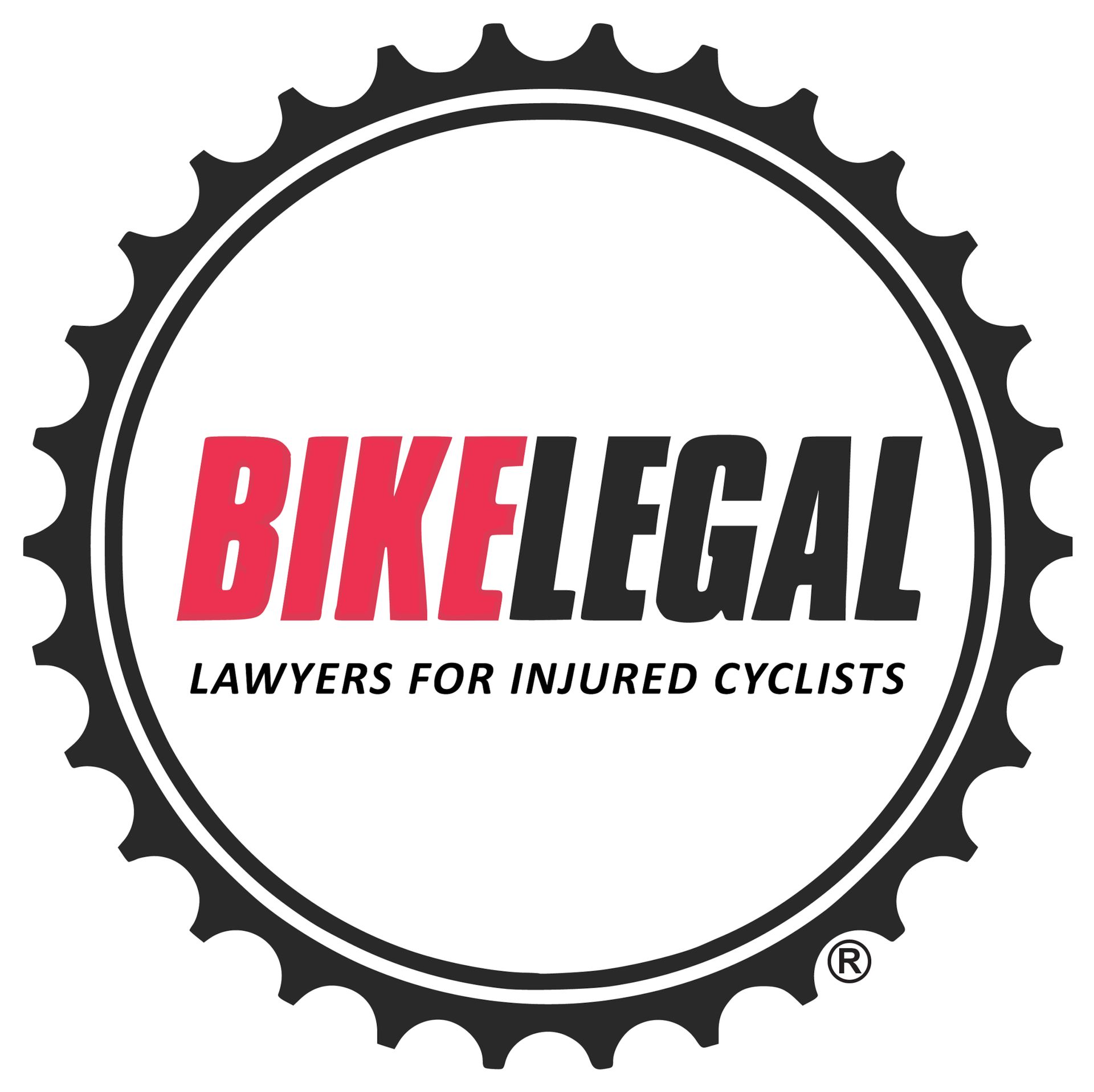
Bicycle crashes can be scary and overwhelming, but you don't have to do it alone. At Bike Legal, we are committed to providing you with the knowledge and support you need. Our comprehensive guide, "Answers to the 21 Most Asked Bicycle Accident FAQs," is designed to address your concerns and empower you with vital information.
Whether you need immediate advice post-accident or have detailed legal inquiries, our experienced team is ready to assist. With a passionate team that's as devoted to cycling as to the law, we offer more than just legal assistance—we provide peace of mind. Contact Bike Legal today for expert guidance and support in protecting your rights and ensuring your safety on the road.
